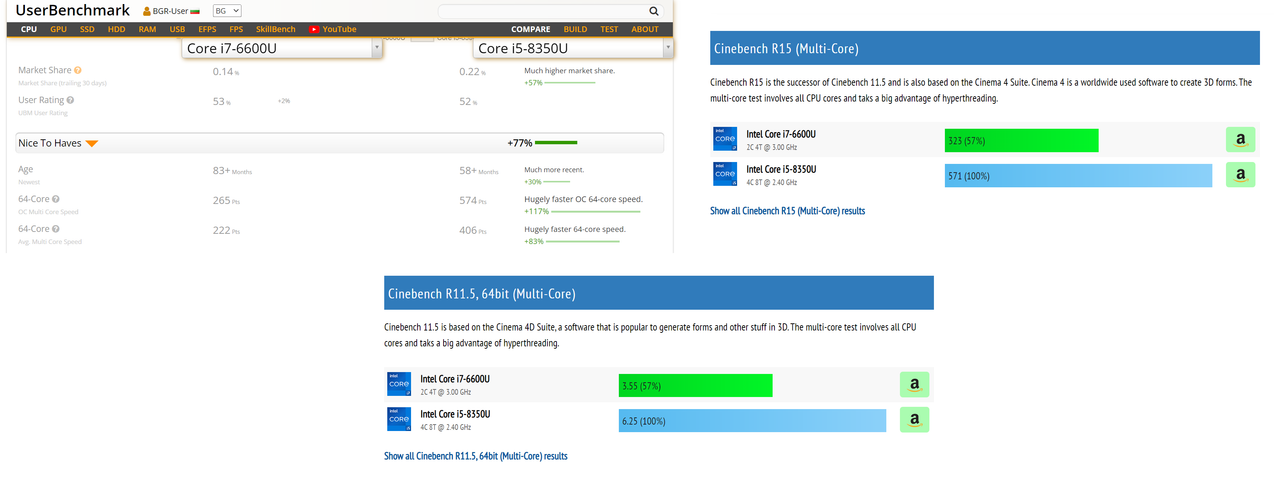i wanna know which is better as the i7-6600u has a higher base frequency while the i5 has 4 cores and 8 threads but lower base frequency.
Thanks in advance!
This is basically the same as saying "Google it", which we seriously frown on here. Just saying....I want you to show me
Thanks dude!The 8350u is much better. It has about 10% faster single core and about 80% faster multicore performance.
trust me i did but i'm no tech savvy , i just wanna know which is better base frequency of number of cores....I want you to show me

Of course, it is good to think this way; there's truth in every opinion. Thing is though, back in the day, like before 11 years when the i7-990X was the thing, Passmark proved incredibly incorrect in regards to the GPU sector and slightly, but still incorrect in the case of some CPUs and their performance on the graph.Please, don't insult the community by posting Userbenchmark scores here as if they mean something. They don't. They are literally worthless.
Passmark on the other hand is AT LEAST nominally relevant in terms of real world usage. Regardless that apparently some of our newer members seem to disagree.
https://www.cpubenchmark.net/compare/Intel-i7-6600U-vs-Intel-i5-8350U/2608vs3150
Yes, but let's be real, that can be said of EVERY pre-built system, whether laptop or desktop, ever. So, this is really not some incredible academic insight. It's relative, as are ALL benchmarks and performance test results. It's STILL relevant though because BOTH or ALL of what is being compared are running the same thing, and when it comes to the Passmark scores, running MANY things. Unfortunately Anandtech bench doesn't have these mobile parts for comparison otherwise we could look at a plethora of different results, but suffice to say that when we are talking about a nearly or in this case, actual, 80% difference in threaded performance, even if we fudge it to the probable lesser result and say only 60%, that's still a big difference. So, not sure why we are trying to play devil's advocate here.One of the problems in comparing laptop CPU's is their performance can vary depending on how they have been configured by the manufacturer.
Yes it applies to every pre-built system but I would say it's easier to gauge the performance of a desktop than it is a laptop. I have a 7th gen dual core and 8th gen quad core, for many workloads the 7th gen is a lot faster and the gap in multi-thread is much smaller than the benchmarks on the internet would suggest. This is simply because it the 7th gen has been configured for a higher TDP and the 8th gen machine will eventually drop to it's base frequency under a sustained load even if it's not using all 4 cores.Yes, but let's be real, that can be said of EVERY pre-built system, whether laptop or desktop, ever. So, this is really not some incredible academic insight. It's relative, as are ALL benchmarks and performance test results. It's STILL relevant though because BOTH or ALL of what is being compared are running the same thing, and when it comes to the Passmark scores, running MANY things. Unfortunately Anandtech bench doesn't have these mobile parts for comparison otherwise we could look at a plethora of different results, but suffice to say that when we are talking about a nearly or in this case, actual, 80% difference in threaded performance, even if we fudge it to the probable lesser result and say only 60%, that's still a big difference. So, not sure why we are trying to play devil's advocate here.
You're living 2 years in the future. 😉Dude. Forget about the 6600u. It's 9 years old and at this point

